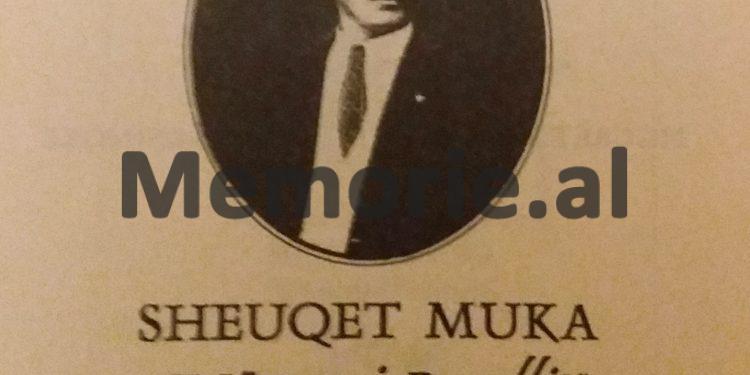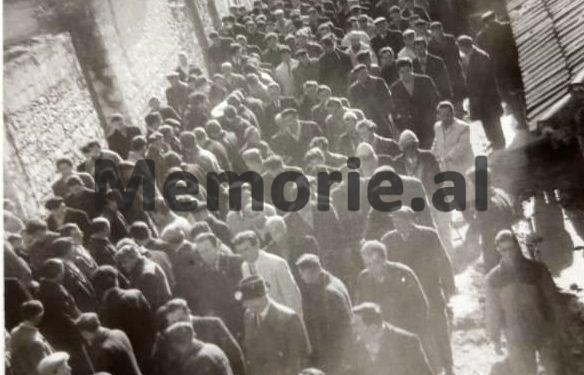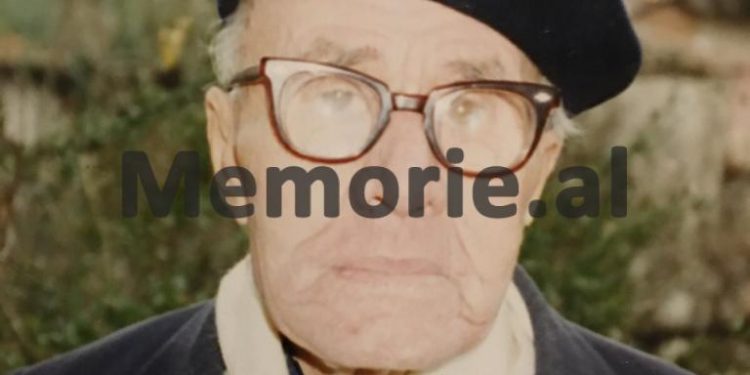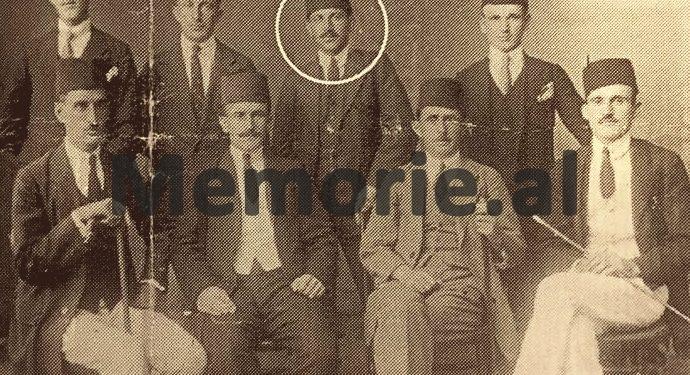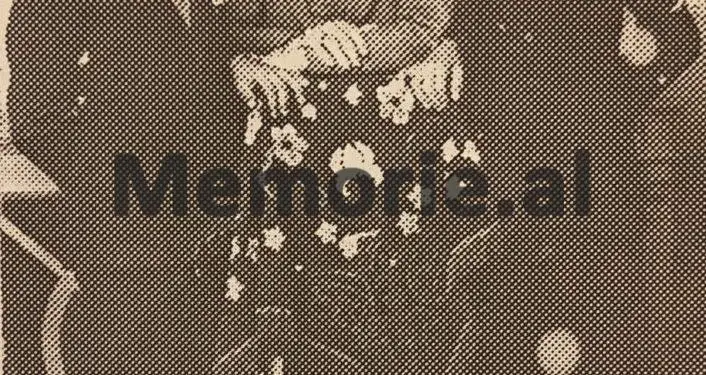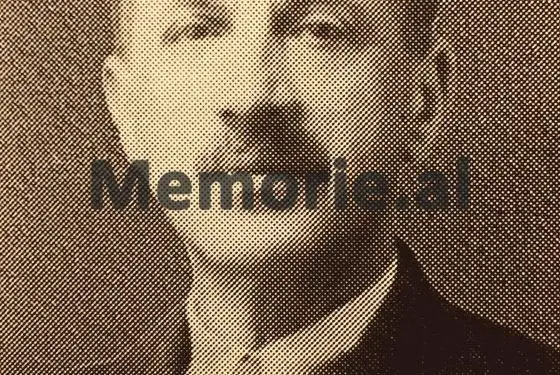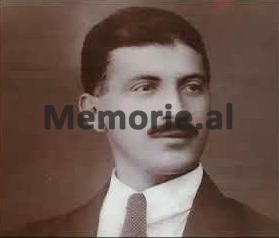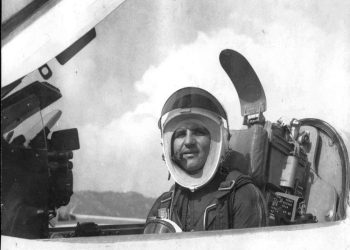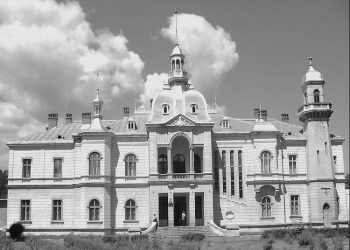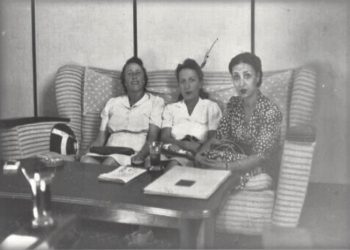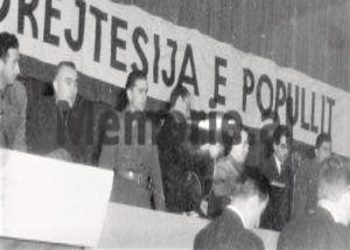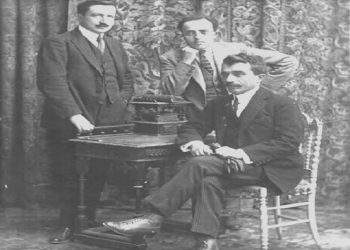Dr. Faik Luli
An important field of the valuable and comprehensive activity of Sheuqet Muka is also that of the Islamic intellectual. In addition to the activism and known and valuable results as a teacher and director of the school of Parruca in Shkodra, as director of the “Vorfnore Shelter” in Tirana, as one of the initiators of the main ardent promoter for the opening of the Gymnasium in Shkodra in 1922, as progressive contemporary teacher, as a participant in educational congresses, as an activist of cultural societies, as an author of textbooks, as a patriot determined against foreign invaders, as a democratic nationalist persecuted by the dictatorship, he is also distinguished for his great work in religious field. Sheuqet Muka’s contribution to the affairs of the Islamic religion has involved a wide range of problems. Sheuqet Muka’s activity sums up his work as a teacher of the new Madrasa, as a compiler of textbooks for teaching the faith in primary schools, as a translator of “Jasina”, as a publicist with religious themes, as a member of the Cultural Branch of the Muslim Community in Tirana, as an activist of the Shkodra Mufti, as a representative of the Shkodra Islamic intelligence in important gatherings, etc. The question rightly arises: How did Sheuqet Muka manage to become so mentioned in the religious aspect, how did he get the education and training necessary for such a multifaceted activity?!
Initial education of Sheuqet Muka
Sheuqet Muka received his initial education in mejtep and later in the prominent Islamic intellectual Hajji Hafiz Ibrahim Kaduku, in the myderrizs and imams in voice, such as: Hajji Hafiz Salih Myftia, Muhamet Bekteshi, etc. As well as from an uninterrupted intensive individual study. Learning Arabic and many other Eastern and Western languages, such as polyglots, careful study of the Qur’an, prophetic hadiths and Islamic history, establishing a rich and rare library, continuous collaboration with religious personalities of the whole country, knowledge of the condition and needs of places of worship, of religious institutions, contacts with Islamic believers in general and especially of youth and women have engaged him to deal in parallel with official duties and problems religious. The religious contribution of Sheuqet Muka has had a growing graph, it has been more visible, more fruitful, in accordance with his intellectual growth, with his affirmation in the environment of the Shkodra and Albanian civic opinion. His devotion to religion in general and to some of its problems in particular caught the eye of the governing religious education bodies, which created the idea of shaping the perspective of this active and tireless young man. His presence as a representative of the Inspectorate of Education in the annual exams of the Upper Madrasa in the Bazaar of Shkodra in the school year 1926-1927, the conclusions drawn and the proposals made in the relevant report influenced the appointment of an external teacher of the new Madrasa in 1927-28. The students of this school could not find words to praise their new teacher. They said that in addition to the mentioned religious leaders and professors, there were also teachers of general culture as competent and memorable as Sheuqet Muka, Hasan Tahsini, etc. They showed their scientific, pedagogical, didactic and communication skills, as well as the correct interpretation of the subject in accordance with the principles of Islamic fees. With the preparation of the experience he gained, Sheuqet Muka took the initiative and achieved the goal by doing a commendable work for compiling textbooks for teaching the faith and translating “Yasina”.
Compiler of textbooks for primary school students
In 1923, important events took place for the Albanian Islamic believers: the Muslim Congress took place, the publication of the magazine “Zani i Naltë” began, the organizational structures of the Muslim Community were created in the center and at the base, etc. At this time the need arose to compile textbooks of faith lessons for primary school students. Sheuqet Muka was the first to respond to this difficult task, without tradition in our country, but with great educational values. He compiled three such books one after another (Ilmihal), as early as 1923, which were approved by the High Council of the Jamaat-e-Islami and the Ministry of Education. Focusing only on the first book, it turns out that the author has prepared it with a rare skill, with great care, with religious accuracy, with pedagogical and methodological competence. The book consists of 27 separate lessons, which contain the presentation of the topic in detail based on issues. In this context, generalizing the accumulated experience, later, in 1927 he published the book ‘Memories of the former students of the new Madrasa.
Sheuqet Muka, “Ilmi-halle”, for the first-grade students of the second period, Shkodër, 1923, etc. “Practical religious knowledge” for primary and post-secondary schools, which is the beginning of the publications of the High Council of Sharia with no.1. This book is more improved, more voluminous and more attractive from a technical point of view. It is worked in a good presentation form, has the development of the topic in detail, which continues with summary, with historical story, with tasks in the form of questions of theoretical and practical character and at the end there is a dictionary explanation. More scientifically and methodically, there is no way to work on topics of this nature at that time and which remain relevant even today. The merit of Sheuqet Muka for the publication of this literature was incomparable. He was the first to set a good example, to fill a gap, to provide a series of religious books of this nature, so necessary to meet the needs of children, youth and believers. The value of these is added by the fact that they were in their mother tongue, understandable, clear and concrete, with a beautiful style and chosen vocabulary.
Thus, for example: the topic “Zakat” contains: “Conversation about zakat”, “Abbreviation”, “Duty”, “Events” (story): “A man who does not share zakat” and “Words to be explained”. The original creativity of the author also includes some creations in poetry, ilahi and qasidah, which express subtle religious feelings, devotion and appreciation of historical events from the Islamic religion, Yasina, about which the Prophet Muhammad (pbuh) said: has a heart, and the heart of the Qur’an is Yasin; I would like this surah to be in the heart of every man from my ummah! Sheuqet Muka translated it in 1929 at the request of the association “Talebet of the New Madrasa”. The preface of the translator is an analysis of the content of Surah Yasin and its importance, it is a presentation of the duties of the Islamic believers regarding it. At the beginning of this preface, the author, in addition to expressing modesty for the work done, praises the students’ initiative: “Mue, with that small power of my mother, you will always have me the biggest supporter, because your program really is sacred and its realization is a great fortune for the Muslim element of my country. With the publication of books and translations in our beloved language, the bird of the Muslim Albanian would have taught us the commands and prohibitions of the religion, it would have really been a healthy limb for its fellow-believers and compatriots and for all human society. good luck”. This translation was published under the pseudonym “Shkodrani”. It had an echo, it became a favorite booklet of every Shkodra and Albanian family and it influenced the growth of religious culture. It is unfortunate that this valuable contribution, among the first translators, accompanied by explanations, has not been recognized by various scholars from Albania and Albanian territories or, when it is known, no attempt has been made to know the author’s name. Closely related to the original creativity and translations are his numerous writings of a religious character. Sheuqet Muka usually wrote under pseudonyms, due to his official secular position. Numerous journalistic articles signed with the nicknames “Shkodrani”, “Arsyeja”, “Erzeni”, etc., in the magazines “Zani i Naltë” and “Kultura Islame”, are another valuable contribution of Sheuqet Muka for solving the worrying problems of the Islamic religion not only for Shkodra, but also for the country and all Albanian lands. The theme of these writings is diverse in content and form, it includes reminders of personalities, beating religious, educational, cultural, emancipatory problems, inter-religious tolerance, patriotic education, discussions, remarks, proposals and criticism. These original publications and writings had a great positive effect on the readers.
Echo of the Myslyman Congress in the journalism of Sheuqet Muka
They were informed with realism and objectivity about the state of many troubling problems of the time, were educated with religious and patriotic feelings, became more aware of the responsibility of the governing bodies and their role in solving the sharp tasks in the regions of in the leadership of the Muslim Community, were the active participation of their author for quick, fair, progressive and contemporary solutions, were ideas for improvements, for reforms, for turns dictated by religious and national development. In the article “A new period”, in 1929, in response to the Muslim Congress and the approval of the Statute of the Albanian Muslim Community, he expresses his optimism for the first positive steps of the Islamic religion in our country in several directions. Sheuqet Muka begins his article like this: “After a ruthless decadence that made you lose all hope that we could sometimes improve our religious situation, in recent times fortunately they have started to look like good that we, with the help of the River, not only can we be treated as Muslims, but we have white eyes and days for our fento … ”How not to add hope, how not to The heart rejoices today, when we see with our own eyes that in the Albanian language have begun to be written works of religions of great value to the side of the developing country that they have? How can we stay without showing the world that the expectation of our religion in a free monarchical Albania would have been definitely excellent, when we see that among Muslim Albanians we have people with excellent positions in terms of knowledge and mind and in terms of pen? and the judgment we possess. The two works: “Teaching Religions” and “Friday Tips” which were published years ago at the initiative of the General Directorate of Waqfs, are good signs that give us new breath and make us believe that the machine of the High Council of Sharia was best put to work to complement his Muslim element, which represents the first and greatest shortcoming he had. Is it a small matter that the Tafsir of the Qur’an was published in its original form? “Then we have reason to say that for the Muslim Albanian a new period of awakening has begun, which without a doubt will keep us going and will keep us honored, and raise us to the side of religion”. Shefqet Muka has also been distinguished in the memorial writings of prominent religious figures. This happened on the occasion of the death of Sheh Shaban Domnori. Article “Rahmet pastë!” is a very touching, concise, pathetic, elegiac, praiseworthy and inspiring lecture in honor of the great personality. Among other things, he writes: “Who gave a soul to the holy religion of Dini Islam? Do you cry and mourn sod Shkodrani, Shkodra desolate? Who goes to the new cemetery of Dudas – Ndocaj neighborhoods? Do you owe now in your own gender this happy grave? Is not one of the great imams, the virtuous gods who counts and distinguishes with his finger sod our Shkodra? No, there is more … But even if this were only the cause, it would be for us to mourn us because with the change of life that you live, enlighten Sheh Hafiz Shaban Efendia, from the line of Shkodra imams comes and breaks an among the best of them, which for us bloomed like the most beautiful flower that our eyes saw, like the most fragrant flower that our soul felt … ”Of this nature is also the greeting made at the funeral ceremony of Hysejn Efendi Vuthit, prominent religious and educational figure, chairman of the prefecture education commission, inspector of education for religious teachers, director of the Russian primary school, one of the first leaders of secular religious education. In his speech, Sheuqet Muka expressed the pain, grief and sorrow for the great loss, for the gap created and appreciated the help given, the impressions and memories left. He addressed his imam as follows: “He strived with flesh and blood for the advancement of national education, so today we lose a good waiter and advisor in the field of education. Not only did I have you as an imam, not only did we have you as a school leader, but today Shkodra is losing a great imam of it, my heart, that of my friends and all the children of the schools and the people are crying and shedding tears for you. We have reason to cry, the loss of an imam like you to us is a black raven. Today we feel the truth of the word which says that the death of a scholar (scholar) is like the death of a scholar (people). In other writings he has dealt with important and sharp topics of the day and perspective. They are interesting, culturally designed, developed with specific goals, permeated by the desire to solve difficult and complex problems. Such are the writings: “Truth never dies”, “Reform and the spirit of Islam”, “We all have a problem”, “An answer that does not answer”, “Against spitting”. Some writings have had an Islamic historical character, such as: “The emergence and spread of Islam”, “Our duty to the Companions”, etc. These have had elements of translating, adapting and tracing world literature. In the verse of Sheuqet Muka’s creativity is to be noted his engagement as a lecturer in gatherings with the believers and in helping the imams for sermons, in which he has kept interesting religious topics, which were distinguished for the depth of content, clarity of treatment, the beauty and naturalness of the presentation of facts and arguments, the richness of language and the eloquent style of the orator. Such lectures have been: “The appearance of Muhammad (pbuh) on the human stage”, “Islam – the natural religion,” Religion in progress or decline “,” The future of Islam is bright “, etc.
Petitions for the opening of the Shkodra gymnasium
In the family archive are found other interesting data in manuscripts about religious creativity. Among them is an Arabic primer with a modern learning methodology, in order for believers of all ages to be able to read the Qur’an and numerous studies, such as: “Letters of the Qur’an”, “The Importance of Mawlud”, etc. etc. Some of Sheuqet Muka’s writings have had the nature of debate, discussion, polemics and protests, expressing his critical opinion and attitude towards irregular and unjust actions, conservative attitudes and inappropriate solutions, situations of violation of the Statute and non-implementation of duties in accordance with it, against not taking the necessary measures for basic religious, educational and cultural issues. The lecture with 10 typed pages, year 1934, is preserved in the archive of the Muka family. In these writings, which include articles, petitions, prayers, letters, papers, etc., the determined and principled personality and character, its regular, just and complete religious, patriotic, intellectual and human formation appear. Letters, petitions, protests and letters of this nature are numerous. They are sometimes individual, sometimes collective under his instigation and direction, designed by him. Thus, we can mention the petitions and prayers for the opening of the Gymnasium of Shkodra. He did not want a special school for Muslim youth, but mixed, common, national, but at the same time he did not want Muslim children to be left without a high school. For this he was the author and co-author of letters and petitions, which with the popular support put the right pressure on the central bodies and ensured the opening of this school, which gave Shkodra and Albania hundreds of thousands of intellectuals in various fields. Regarding the problem of education of Muslim children, he has developed a wide range of activities in other areas as well. He insisted that in the opening of the first secular schools in 1913 and beyond, as well as in the school years 1921-’22 and 1922-’23 and onwards, primary schools be opened where they were missing, so that Muslim children would not remain illiterate. to place Muslim teachers in them, so that in addition to the official teachings they could also develop the teachings of the faith due to the lack of religious staff. For the education of the Muslim youth he raised the problem of improving the work in the General Madrasa, of reviving and consolidating the district madrasas and of setting up a new Madrasa, after their surprise in the city of Shkodra, arguing this with facts convincing and with the experience of this city for religious education. In this complex of problems, he was also interested in Albanian students pursuing higher studies in theological branches in Cairo, Egypt and Lahore, Pakistan. The correspondence confirms that they addressed Sheuqet Muka for fulfillment of needs, such as scholarships, etc. Another aspect of Sheuqet Muka’s activity for the benefit of the Islamic religion is the practice of letters and protests addressed to the Deputy General, the Prime Minister, the Minister of Education, the President of the Albanian Muslim Community, the Control Council of this community, the magazines “Zani i Naltë” and “Islamic Culture”, the Supreme Court of Sharia, the Mufti for violations of the Statute of the Muslim Community, for its regular assemblies, for the proper election of governing bodies, for not performing proper duties, for not properly caring for madrassas, for lack of interest and proper implementation of the teachings of the faith in schools, for the appointment of appropriate staff in the muftis and sub-muftis, for the non-implementation of some tasks of the Congress, for the good administration of the Vakufnore property, etc. etc. They reflect his initiative to pose problems and weaknesses, his courage and desire to contribute to the overall well-being of the religion, his commitment to help its advancement. From these numerous materials we are highlighting a fragment, which is an indicator of the competence of Sheuqet Muka for identifying the weaknesses and the most primary problems and for putting the superior bodies before the responsibility to solve them in accordance with the current tasks of the perspective. In a petition written to the Viceroy General for the Muslim Community, he addresses many delicate organizational and leadership issues and also dwells on the teaching of the faith and the Madrasa, where he underlines: “… the important point of the teaching of the trust among schools, both in primary and secondary schools, and therefore our youth has grown and is growing without having the good fortune to receive a religious education, with bitter consequences and very harmful for the future. The vital problem of the only religious institute of the General Madrasa in Tirana has always been neglected, which, although it is well seen that it can no longer replace the religious officials who are dwindling day by day. The General Council has not so far devoted itself to taking its reform seriously to enable me to meet our religious needs. In an open letter addressed to the President of the Muslim Community, among other things, after arguing the backwardness, disorganization and lack of a systematic work, he states: “… The Muslims of Albania must be the most developed of all Muslims in the world, for because they are from Europe … In the genus of the Water Community that you represent, there is a new element that has not been cooked in this way until yesterday: in addition to the sick crowd of people, you have university students, graduates, semi-graduates of a large number of Primary school students, which Albania has never had. We do not lack anything, we do not lack the will to go ahead and it was kept as a living and progressive element in the navel of Europe … ”Sheuqet Muka did not spare to give his help in the directions as well others: as a Mufti activist, as an associate of the High Sharia Council, as an Adviser of the Muslim Community, as a member of the presidency of the Cultural Branch of the Muslim Community with the prominent personality Mehdi Frashëri as chairman, etc. In all his activity for the benefit of religion he always had in mind religious tolerance, inter-religious cooperation, education for coexistence, for peace, harmony and friendship between the believers of the three religious’ faiths. Examples of this are numerous. We are mentioning any of them.
Friend and collaborator with Gjergj Fishta
Sheuqet Muka was a friend and collaborator with Gjergj Fishta in the education commission of the prefecture of Shkodra and there with other religious and secular intellectuals gave their valuable assistance for the progress of state and private education, secular and religious. An expression of this friendship and cooperation was the participation of Sheuqet Muka in the ceremony celebrating the 60th anniversary of the birth of Gjergj Fishta. In the rich scientific, religious and artistic program, along with Father Anton Harapi, Ernest Koliqi and Zef Kurti, Sheuqet Muka also gave a lecture on the topic: “The work of Gjergj Fishta for the national awakening”. Another fact of this tolerance is the appreciative and honorable note that the famous writer Mark Harapi in a work of his own dedicates to Sheuqet Muka: “Sheuqet Muka, a man like the men of the weather, an unforgettable husband of the communist prison. This theological lecture on the Holy Trinity, he writes according to his desire and frequent encouragements, the author dedicates to him as a sign of friendship and award with real pleasure. ” In her writings, lectures and conversations on various topics, Sheuqet Muka always had in mind the intertwining of the religious side with the patriotic side and vice versa. There are many examples, but we are quoting some of them for concretization. In the lecture “The cordial flag”, on the occasion of the Independence Day, among other things, he said: “… The enemies and traitors of our nation did not find out that there is no Turk in Albania?! There are no Turks or Kaurr, there are only Albanians of Muslim, Catholic and Orthodox faith. Come, talk to me and my friends, come and find out how we think and how we will work. Each of us will keep the faith he has for himself, each of us will honor and associate the faith … I think it is a shame for an Albanian Muslim to speak against an Albanian Christian, it is taken again for an Albanian Christian to speak for his brother, “Why do you work like this? We clearly show that we do not have national feelings.” Sheuqet Muka did not interrupt his religious activity even when he was imprisoned, even in labor camps condemned by the communist dictatorship. Despite the difficulties, obstacles and dangerous consequences, he remained a tireless activist in educating prisoners with religious teachings, teaching them Qur’anic passages, telling them about Islamic history events, encouraging them to step up their efforts for spiritual education, and strengthening their patience. it raised the hope for life, the future, for freedom and democracy. His accomplices benefited from his personal training, experience, faith, and example.
Appreciations for the figure and personality of Sheuqet Muka
For the figure, personality and character of Sheuqet Muka, many evaluations have been given in recent years by various scholars. In addition to the decoration with the high title “Teacher of the People” by the President of the Republic for his outstanding contribution in the field of state education, his merits in the religious aspect have been noted. Thus, on the occasion of the inauguration of the “Abu Bakr” mosque in Shkodra, Mufti Faik Hoxha in his greeting stressed that patriotic imams harmonized the honorable role of educator and preacher in accordance with religious and patriotic education together with secular leaders and teachers. scholars and activists known as Sheuqet Muka etc. When it was spoken and written about prominent religious personalities, it was pointed out that in the institutions and religious activities that they have led and developed, civil intellectuals have also participated. In the lecture “Tribute to the prominent scholars, educators and imams of Shkodra”, among other things, it is said: valuable, compiling with competence, knowledge and professional skills religious texts for the teaching of faith for state and religious schools for the teaching of faith for state and religious schools, as well as excelling in the field of studies and linguistic and literary publications, cultural and historical”. Likewise, writing about Haji Hafiz Ibrahim Kaduku, as a prominent educational and religious intellectual, it is claimed that in the Madrasa he led, “His work laid the sound foundations for this school to gain its physiognomy, to gather students of selected, to provide effective pedagogical staff, experienced external, such as … Sheuqet Mukën etc. In the study material “Cultured and pious sons of Shkodra”, this consideration is also emphasized: working diligently not only in the field of secular education, but also in the field of faith, in their direct engagement in the teaching process and in the enrichment of religious literature with translations, adaptations and drafting of texts, as well as with their assistance to the organs of the relevant press.” Older believers report that in Shkodra in the 1920s, there were “Two whistles holding sermons and talks, writing books and publishing in magazines, they were Hafiz Ali Korça and Sheuqet Muka”. Rhapsody Dedë Shyti has given appreciation for the patriotic-religious role of Sheuqet Muka in his work “Bloody Rhapsodies” and “Rhapsodic Chronicle”. This author says: “Halal ‘kjoft e Shqipnisë buka, Xhemal Naipi e Sheuqet Muka, Religious patriots and patriots, Egër oppressed the dictatorship”. “With Xhemal Naip, Sheuqet Mukë Shkodran, and how many others from the South of Tirana, Projects dreamed, for the Albanian mother, in what clutches they had left her”. For the positive qualities of Sheuqet Muka, considerations and memories have been expressed by religious authorities, such as Haxhi Hafiz Sabri Koçi, President of the Muslim Community of Albania and Haxhi Faik Hoxha, the Mufti of Shkodra. His Grace Haxhi Hafiz Sabri Koçi, has expressed the following considerations: I knew the honored intellectual, Mr. Sheuqet, in the time of “Zog”. At that time, he enjoyed great respect in the intellectual circles and throughout the people of Shkodra. He was a firm believer and very devoted to the cause of religion, a capable and honorable intellectual, tireless and unstinting for religious and secular teachings, a passionate scholar in general and of religious problems in particular. During his time in prison, he was noted for his manly character and love of Islam. Even there he did not interrupt religious instruction for others. A gentleman from Peshkopia, named Rexhep Agolli, told me about Mr. Sheuqet, that in prison he had taught him to read the Qur’an and many other lessons and religious duties. After my release from prison, I met with him several times to discuss important religious matters. Among other things, he intended to engage in translating the Qur’an from Turkish into Albanian and expressed concern that he would be able to fulfill his wish. He never stopped working to contribute to religion and beyond. Haxhi Faik Hoxha expressed these memories: “My father, Sheh Qazim Hoxha, had a close friendship with Sheuqet Muka. From the visits made to my house, from the conversations that took place, from the opinions heard and from the impressions spread in the public opinion, I learned that Sheuqet Mukaka was a well-known personality not only for Shkodra, but nationwide for the assistance given in the activity. patriotic, in the field of national education as well as in the religious field, as a supporter of any improvement, as an opponent of any obstacle, negligence, indifference and delay in the development and progress of Islam. He also showed positive qualities during his stay in prison. There I met prisoners who had served their sentences in Burrel together with Mr. Sheuqat, who had taught them the method of prayer and the Arabic alphabet for reading the glorious Qur’an. This is what Veli and Tahir Bicaku from Librazhd of Elbasan, etc. had done. Sheuqet Muka throughout his life and after his death, has been remembered and is remembered with special honor and appreciation for the valuable help he has given as a prominent Islamic intellectual from Shkodra and Albania “. The above presentation of the religious activity of Sheuqet Muka allows us to draw some general conclusions characterizing his personality and contribution. He did not find the way open, the problems posed, the worries solved, the wishes and dreams fulfilled, but he started it himself from the beginning, walked on unexplored paths, in an unfavorable environment, in difficult conditions, with overload state duties, however, engaged, worked and fought and achieved success, having the merit of being the initiator and pioneer of creating a rich tradition in the field of culture and Islamic education. He had no religious education and specialization, did not perform functional clerical duties, did not serve in religious institutions and objects, had no religious garb, yet he was formed as an Islamic intellectual, as a tireless missionary of the Islamic religion. He was distinguished among the most distinguished for readiness, mobilization and dedication, for activity and creativity, using culture and knowledge to oppose the backwardness of darkness, for the new, truth, Islamic light to triumph. To achieve these, in addition to knowledge of culture, he needed authority and popularity, and he acquired these qualities because he was principled and enthusiastic, loving and popular, tolerant and friendly, honest and fair, simple and polite. His contribution to the benefit of the Islamic religion in those conditions and circumstances is rare, great, effective, comprehensive, because he was a source of knowledge and education, education and Islamic culture. With this incomparable activity and creativity, Sheuqet Muka has placed himself in the forefront of prominent Islamic secular intellectuals, as a true and devout missionary, as a beautiful example and model of inspiration, who will always be remembered by generations with reverence. of appreciation, with perpetual kindness and gratitude. /Memorie.al




